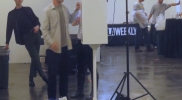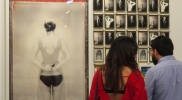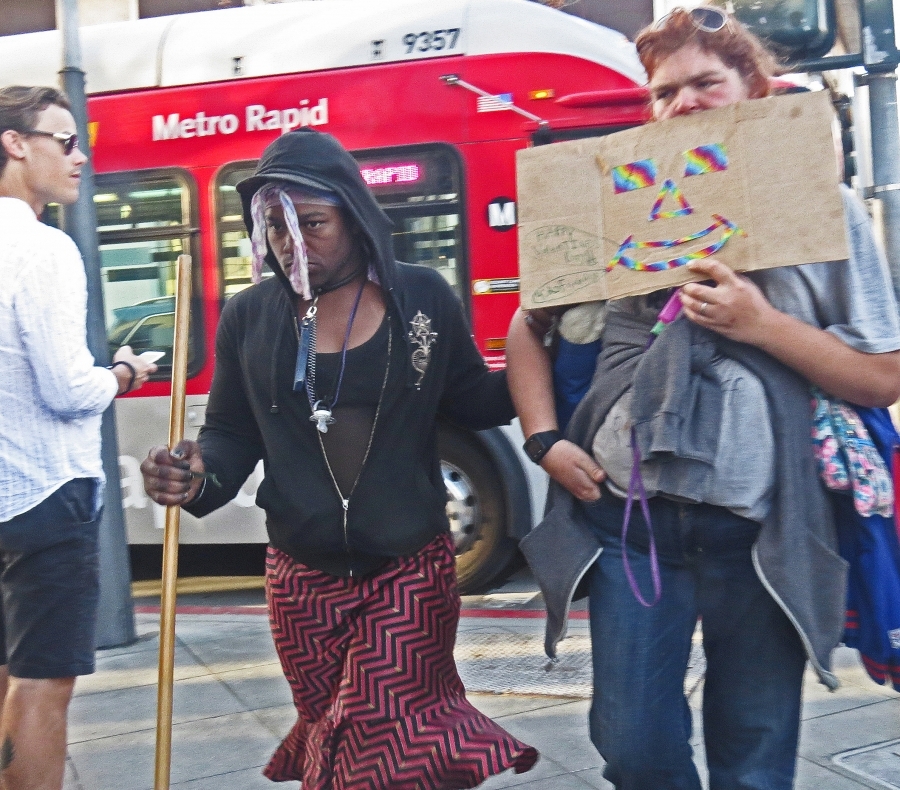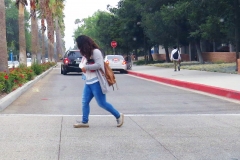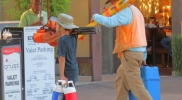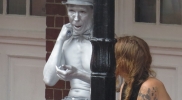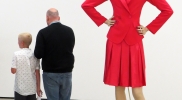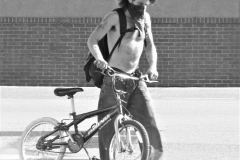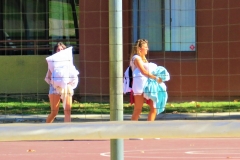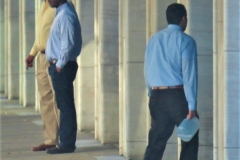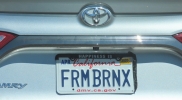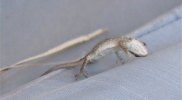|
|
Best Trivia - Fame
|
Favorite Trivia – FAME
|
| “The only pleasure of fame is that it paves the way to pleasure; and the more intellectual our pleasure, the better for the pleasure and for us too.”
Lord Byron: Selected Letters and Journals
|
| “Though a philosopher said of famous men, disdainfully, that they died two deaths, one in their bodies, another, long after, in their names, he must confess, that where other men live but one life, famous men live two.”
W. Drummond (Bibliotheca Edinburgena Lectori) – The Book-Lovers’ Anthology, ed. by R.M. Leonard
|
“We toil for fame,
We live on crusts,
We make a name,
Then we are busts.”
L.H. Robbins, Lines for the Hall of Fame Ceremony – The Pocketbook of Quotations
|
| “Unsung, the noblest deed will die.”
Pindar, Fragment 120
|
| “She [Edna St. Vincent Millay] became famous in 1912, at age twenty, for losing a contest. When her poem ‘Renascence’ was awarded only fourth prize in an annual competition sponsored by The Lyric Year, the public and critics alike protested. In particular, Harriet Monroe’s stinging editorial in the January 1913 issue of Poetry brought the precocious author much attention. A wealthy woman, Caroline Dow, heard Edna recite the poem and was so impressed she encouraged her to apply for a scholarship to Vassar, and offered to cover her remaining expenses.”
100 Essential Modern Poems by Women – ed. by Joseph Parisi and Kathleen Welton
|
|
“Short is the life which nature has given us: but the memory of a life nobly laid down is eternal.” [Philippicae., XIX, 12.]
Cicero
|
|
“As you say, I am honoured and famous and rich. But as I have to do all the hard work, and suffer an increasing multitude of fools gladly, it does not feel any better than being reviled, infamous and poor, as I used to be.”
George Bernard Shaw, Letter to Frank Harris (Christopher Morley’s Book of Days for 1931 [June 2])
|
| AUTOGRAPHS:
“People never ask autographs for themselves. Autographs are always for nieces, nephews, wives, children, uncles, aunts, or the girl or boy friend. The request for the autograph, most of the time, is made in restaurants, for example when one just puts a piece of meat in one’s mouth and is about to swallow it. It is always preceded by the sentence ‘I hate to disturb you but…’
“The wrath of those nieces, nephews, etc., is held up as the bugaboo for the urgency and the strange object being extended to you. Those objects are: tiny pieces of paper, the inside of matchbooks, handkerchiefs, dollar bills, ties, paper napkins, and more of such objects that refuse to accept the ball-point ink. The ball-point pen in question is not extended to you. All autograph seekers, with very few exceptions, seem to think that the victim of their pursuit has a pen permanently attached to his hand. Other people are inconvenienced, and waiters usually come to the rescue. While one writes or tries to write, the conversation continues in the same vein: The autograph seekers—by now there are many of them—are trying to destroy any suspicion that the autographs might be for themselves. This must be triggered by a desire not to appear immature.”
Marlene Dietrich’s ABC
|
| “His ashes are here; his name everywhere.”
Inscription on Gen. Marceau’s tomb at Ehrenbreitstein
|
| “I went holiday shopping on Rodeo Drive today and thought I’d stop in at the Olive Garden for a quick bite. There was a big fat guy in line with his equally porcine wife right in front of me. I walked up to the hostess to ask her how long the wait would be. Suddenly, he yelled, ‘Hey, we’re all waiting, here, sister. Don’t use that celebrity thing to cut the line.’ I was shocked. I never ever ever use the ‘celebrity thing’ unless it’s an absolute emergency such as being late for a mani-pedi. I tried to explain to him that I was simply asking the hostess a question, but he turned away, so I said to her, loud enough for colossus to hear, ‘Is there any chance I could be seated right now? I’m a celebrity and if I have to wait for my table until after Tubby McShit is seated and has ordered, I’m afraid your Bottomless Pasta Bowl will have to change its name.’ She said, ‘Of course, Miss Rivers, right this way.’ As I was walking past Mr. Oink, I said, ‘Don’t worry, Pork Rib, there will be plenty left for you; I won’t be ordering the slop.’” [December 10, 2103]
Joan Rivers – Diary of a Mad Diva
|
| “Celebrity! the honor of being known by those who know you not.”
Nicolas Chamfort
|
| “Before I was so strung out, I used to go out and pick up girls and bring them back myself. Now I’m too reclusive to do it. Every time I go out, somebody gets in my face and wants something from me, and I just can’t handle it. It’s not just the drugs, it’s the fame… it’s overwhelming these days to go anywhere. We’re on the cover of every magazine on the newsstand.” [Feburary 27, 1987]
The Heroin Diaries: A Year In The Life Of A Rock Star – Nikki Sixx
|
| “Once born we cannot escape our humanity. We have one chance to leave a word or two, a single concept that is worth a dime. For all our puny hopes and dreams and sparkling ideas, we cannot escape the forever of the cold, cold ground.”
Thomas DeBaggio – Losing My Mind: An Intimate Look at Life with Alzheimer’s
|
| “By the way, I’m almost famous! There is a bulletin board in College Hall (where the President and all the deans work), which has weekly clippings of Smith girls ‘in the news.’ Yup, some news hound dug up my poem [‘Ode to a Bitten Plum,’ Seventeen, November 1950] and it and my face shine out.” [November 30, 1950]
Sylvia Plath – Letters Home: Correspondence 1950-1963, ed. by Aurelia Schober Plath
|
|
I hope you won’t give our number or address to any more people . . . because it simply puts us in the position of refusing to go out (it’s too expensive in time and money) and conspicuously not inviting anyone over because if we don’t firmly put our feet down, we will become simply a way-station for all sorts of travelers. The baby’s feedings and keeping the house clean, cooking, and taking care of Ted’s voluminous mail, plus my own, have driven me so I care only for carving out hours where I can start on my own writing. . . even a modest fame brings flocks of letters, requests, schoolgirls asking for ‘the author’s own analysis of the symbols in his stories,’ etc., ad nauseum.
“If Ted didn’t have his study, he’d be distracted by the phone, the mail, and odd callers so he’d get no work done at all. And as his secretary and my own, I have a personal reason for being strict. So please help us by not steering anyone our way.” [May 30, 1960]
Sylvia Plath – Letters Home: Correspondence 1950-1963, ed. by Aurelia Schober Plath
|
| “. . . to return to my first meal with Mr. DiMaggio—he didn’t try to impress me or anybody else . . . Then I became aware of something odd. The men at the table weren’t showing off for me or telling their stories for my attention. It was Mr. DiMaggio they were wooing. This was a novelty. No women had ever put me so much in the shade before.
“But as far as I was concerned, Mr. DiMaggio was all novelty. In Hollywood, the more important a man is the more he talks. The better he is at his job the more he brags. By these Hollywood standards of male greatness my dinner companion was a nobody. Yet I had never met any man in Hollywood who got so much respect and attention at a dinner table. Sitting next to Mr. DiMaggio was like sitting next to a peacock with its tail spread—that’s how noticeable you were . . .
“Men are a lot different than women in this respect. They are always full of hero worship for a champion of their sex. It’s hard to imagine a table full of women sitting for a whole hour flattering and wooing another woman if she were three champions.”
Marilyn Monroe (with Ben Hecht) – My Story
|
| “The organs of publicity that have proliferated in our time are only an extension and a magnification of society’s fundamental and incorrigible nosiness. Our business is everybody’s business, should anybody wish to make it so. The concept of privacy is a sort of screen to hide the fact that almost none is possible in a social universe. In any struggle between the public’s inviolable right to be diverted and an individual’s wish to be left alone, the public almost always prevails. After we are dead, the pretense that we may somehow be protected against the world’s careless malice is abandoned. . . The dead cannot be libelled or slandered. They are without legal recourse. “Biography is the medium through which the remaining secrets of the famous dead are taken from them and dumped out in full view of the world. The biographer at work, indeed, is like the professional burglar, breaking into a house, rifling through certain drawers that he has good reason to think contain the jewelry and money, and triumphantly bearing his loot away. . .
“The freedom to be cruel is one of journalism’s uncontested privileges, and the rendering of subjects as if they were characters in bad novels is one of its widely accepted conventions. . .
“As a journalist dealing with a live subject, I had an advantage over the biographer dealing with a dead one: I could go back to Anne again (and again and again and again, if necessary) to draw my portrait of her. . . I could actually ask her the questions the biographer only wishes he could ask his subject.”
Janet Malcolm – The Silent Woman: Sylvia Plath & Ted Hughes
|
| “. . . on the evening of November 9, 1985—le tout Washington had been mesmerized by her [Princess Di’s] whirl across the East Room of the White House in the arms of the movie star and disco dance icon John Travolta. . . The finest face-lifts from Bel Air and Georgetown floated above the pouffiest frocks from Oscar de la Renta, Valentino, and Dior to rattle their rocks in honor of the Prince and Princess of Wales. . . “Travolta had no idea he was going to end up with top billing that night. At the time, his career was idling. Two years had passed since his last big moneymaker, Staying Alive, and the movie that would put him back on top, Pulp Fiction, was still nine years in the future. . . As Travolta donned his new Armani dinner jacket before the party, he mused to himself, ‘Wow, I’m lucky to be asked! I may not be hot, but I’m not forgotten!”
“About 9 P.M., right before the entrée, John Travolta, seated at another table, was interrupted by a tap on the shoulder from the First Lady. She said, ‘Look, there’s only one wish that the Princess has,’ he recalled. And I said, ‘What’s that?’ And she said, ‘That’s to dance with you.’ I said, ‘Really?’ ‘Well, would you do the honors?’ Mrs. Reagan said. ‘Yes, where, how, when?’ I asked. She said, ‘Around midnight. I will tap you on the shoulder and tell you it’s time.’ It was clearly planned, I knew it would be an attention-grabbing moment, and I had three hours to sweat.’
The tap tap on the shoulder comes. My heart starts to race. Nancy takes me over. Princess not facing me, she’s facing toward the president. I tap her on the shoulder and I say, ‘Would you care to dance?’ Her head dips in the famous dip, she blushes a little and says, ‘Of course. I would love to.’ As soon as we get out there, the whole place clears for our encounter. . . I bring her hand from a higher position and gracefully position it lower so she knows I can run the dance, No Talking. Talking during a dance is difficult when seventy-five people are watching you. And I look her in the eyes and reassure her with my eyes, to say, ‘We’re ok.’ We probably only danced ten minute but it feels like twenty.’
“Travolta said that up close he could feel how seductive Diana was. ‘Absolutely, I found her sexy, yes. People are either innately sexual or sensual or not. She had both. She was aware of me and I was aware of her. I didn’t know anyone was taking pictures, to be honest—but I did know it had to look like a million dollars, because it was history being made. And it was my job to make it look as good as if it was in a movie.’
“All the guests I spoke to about that night sensed they were participating in an iconic moment. Washington was and is a dowdy town, a center of power but not of fashion. The wives of heads of states trundle squatly through in their Lurex Escada knits. Among the ‘cave dwellers’ of Georgetown, the reigning bottle blondes from the network news bureaus are all what pass for heat. The imported A-listers, B-listers, and ‘Hollywood Squares’ C-listers from the Reagans’ Bel Air and Park Avenue circles added glitz but not tone. Diana’s combination of beauty, refinement, and youth made her exactly the corrective the Reagans needed. The glow she lent their little dinner-dance made up for roomfuls of Nancy’s usual gnarled, air-kissing, lunch-lady friends and fussy walkers.
“At the end she curtsied, and I bowed, and—well, I guess I turned back into a pumpkin.'”
Tina Brown – The Diana Chronicles
|

Comments are closed.
|
|









